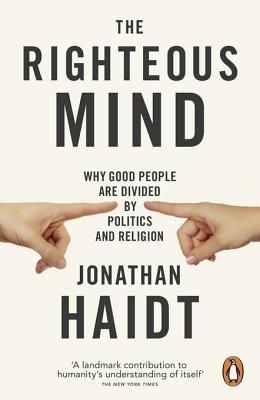More on this book
Community
Kindle Notes & Highlights
Paul Bloom (2004) has shown, we are “natural born dualists.”
research on moral elevation and disgust
long-standing ideological struggles almost invariably involve people who are pursuing a moral vision in which they believe passionately and sincerely. We often have the urge to attribute ulterior motives to our opponents, such as monetary gain. This is usually an error.
Hume noted that some passions and sentiments are so calm that they are sometimes mistaken for reason
This is why I think the word intuition is the best modern rendering of Hume’s word sentiments.
Whether or not Bentham had Asperger’s, my main point here is that his thinking was unusual and his understanding of human nature was poor.
Moral philosophy has gotten better in the last twenty years, in my view, because it has returned somewhat to its ancient interest in the natural world, including psychology. Many philosophers nowadays are very well read in neuroscience, social psychology, and evolution. There has been a growing interest in “psychological realism” since the 1990s, e.g., Flanagan 1991 and Gibbard 1990. For the state of the art, see Appiah 2008 and the three-volume set of essays edited by Walter Sinnott-Armstrong 2008.
our original article (Haidt and Joseph 2004), we described only four foundations, which we labeled Suffering, Hierarchy, Reciprocity, and Purity.
Wilkinson’s bats were probably close kin.
the pleasure of revenge is sometimes an “affective forecasting” error; revenge is often not as sweet as we expect.
liberty”—the right to be left alone. He pointed out that the left had developed a new concept of “positive liberty” during the twentieth century—a conception of the rights and resources that people needed in order to enjoy liberty.
There are not single genes, or even groups of dozens of genes, that can explain much of the variance in any psychological trait. Yet somehow, nearly every psychological trait is heritable.
humans are the “giraffes” of altruism.
Even if chimps and other primates can do it a little bit, we do it vastly more.
selection among shifting groups.
ultrasocial, which encompasses the behavior of eusocial insects as well as of human beings.
Humans are just as closely related to the more peaceful bonobo as to the more violent chimpanzee.
our civilizations now account for an astonishing 98 percent of all mammalian life, by weight,
Richerson and Boyd’s masterpiece Not by Genes Alone.
we humans have some recent adaptations, shaped by group-level selection, that evolved out of our older primate nature
Now that we know that genes can respond within a single millennium,
Glaucon himself was not a Glauconian; he was Plato’s brother, and in The Republic he wants Socrates to succeed. But he formulated the argument so clearly—that people freed from all reputational consequences tend to behave abominably—that I use him as a spokesman for this view, which I believe is correct.
My use of the word should in this sentence is purely pragmatic, not normative. I’m saying that if you want to achieve X, then you should know about this hive stuff when you make your plan for achieving X. I’m not trying to tell people what X is.
The number 150 is sometimes called “Dunbar’s number” after Robin Dunbar noted that this very roughly seems to be the upper limit on the size of a group in which everyone can know each other, and know the relationships among the others;
Durkheimian utilitarianism, the normative theory I’ll develop in the next chapter.
hiving contributes to the well-being and decency of a modern democratic society, which is in no danger of binding individuals too tightly;
Buddhism is usually spared from critique, and sometimes even embraced—e.g., by Sam Harris—perhaps because it can easily be secularized and taken as a philosophical and ethical system resting firmly on the Care/harm foundation. The Dalai Lama does precisely this in his 1999 book Ethics for the New Millennium.
Darwin’s Cathedral
68. I personally think that virtue ethics is the normative framework that fits human nature most closely.
I agree with Harris 2010 in his choice of utilitarianism, but with two big differences: (1) I endorse it only for public policy, as I do not think individuals are obligated to produce the greatest total benefit, and (2) Harris claims to be a monist.
am endorsing here a version of utilitarianism known as “rule utilitarianism,”
grant that utilitarianism, defined abstractly, already includes Durkheim. If it could be proven that Durkheim was correct about how to make people flourish, then many utilitarians would agree that we should implement Durkheimian policies. But in practice, utilitarians tend to be high systemizers who focus on individuals and have difficulty seeing groups. They also tend to be politically liberal, and are therefore likely to resist drawing on the Loyalty, Authority, or Sanctity foundations. I therefore think the term Durkheimian utilitarianism is useful as a constant reminder that humans are
...more
The term moral capital has been used before, but it has usually been
said to be a property of an individual, akin to integrity,
Kane
This highlight has been truncated due to consecutive passage length restrictions.
I’m defining it as a property of a community o...
This highlight has been truncated due to consecutive passage length restrictions.
Hayek 1988 referred to this belief that order comes from rational planning as “the fatal conceit.”
Atran, S., and J. Henrich. 2010. “The Evolution of Religion:
Margolis, H. 1987. Patterns, Thinking, and Cognition.
Wolf, S. 2010. Meaning in Life and Why It Matters.


